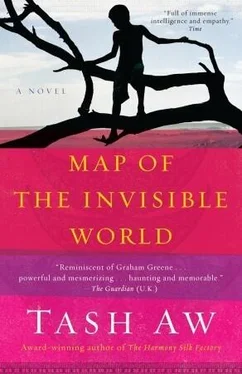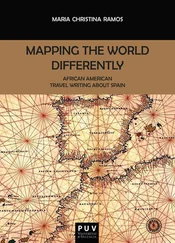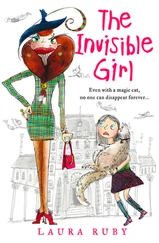Tash Aw - Map of the Invisible World
Здесь есть возможность читать онлайн «Tash Aw - Map of the Invisible World» — ознакомительный отрывок электронной книги совершенно бесплатно, а после прочтения отрывка купить полную версию. В некоторых случаях можно слушать аудио, скачать через торрент в формате fb2 и присутствует краткое содержание. Год выпуска: 2010, Издательство: Spiegel & Grau, Жанр: Современная проза, на английском языке. Описание произведения, (предисловие) а так же отзывы посетителей доступны на портале библиотеки ЛибКат.
- Название:Map of the Invisible World
- Автор:
- Издательство:Spiegel & Grau
- Жанр:
- Год:2010
- ISBN:нет данных
- Рейтинг книги:4 / 5. Голосов: 1
-
Избранное:Добавить в избранное
- Отзывы:
-
Ваша оценка:
- 80
- 1
- 2
- 3
- 4
- 5
Map of the Invisible World: краткое содержание, описание и аннотация
Предлагаем к чтению аннотацию, описание, краткое содержание или предисловие (зависит от того, что написал сам автор книги «Map of the Invisible World»). Если вы не нашли необходимую информацию о книге — напишите в комментариях, мы постараемся отыскать её.
comes an enthralling novel that evokes an exotic yet turbulent place and time—1960s Indonesia during President Sukarno’s drive to purge the country of its colonial past. A page-turning story,
follows the journeys of two brothers and an American woman who are indelibly marked by the past — and swept up in the tides of history.
Map of the Invisible World — читать онлайн ознакомительный отрывок
Ниже представлен текст книги, разбитый по страницам. Система сохранения места последней прочитанной страницы, позволяет с удобством читать онлайн бесплатно книгу «Map of the Invisible World», без необходимости каждый раз заново искать на чём Вы остановились. Поставьте закладку, и сможете в любой момент перейти на страницу, на которой закончили чтение.
Интервал:
Закладка:
“Yes, American. From embassy people,” Bill said, tapping his watch. His Indonesian was faltering. “Must pass now, with quickness, appointment palace.”
The soldier half-smiled, half-sneered. His eyes were invisible behind his sunglasses.
“Please, sir, could you let us through?” Margaret leaned over and smiled at the soldier. “We are guests at the palace and it would be very rude of us to be late for the president’s speech. We’ve been looking forward to it for such a long time.”
“Yes,” Bill added sternly. “People no rude.”
The soldier turned to look at his friends, momentarily uncertain of what to do.
Margaret said, “If you need to check with your superior, please do so. You can say that we are with the U.S. Embassy. We have papers, if you need to see them.”
“Hurriedly, pressure, now.”
“Shut up, Bill.”
The soldier turned back to face them. “Who says you can go to the palace on the president’s speech day?”
Bill smacked both hands on the steering wheel and let out a sharp sigh. “We have authority got. Minister important. Minister Hartono immediate. Call his office quick to confirmation.”
The soldier laughed, his teeth flashing brilliantly in the sunshine. “Hartono. Hartono!” He called out to his friends, repeating the name several times. Margaret could hear their staccato laughs, punctuated by smokers’ coughs. “The man of whom you speak, the man who is one of your dirty corrupt puppets, he is no longer a minister. He is no longer one of the people who work for you.”
“Unbelieve. Call Minister Hartono now.”
The soldier shrugged. “Your puppy dog Hartono has been … removed from office. We are not expecting him to return.”
“This lies! Yesterday I telephone speak him.”
“And this morning he is in prison. I’m asking you to leave now, sir, but I am not going to ask you politely again.” There was a slight change in the way he held his gun; a minute shift, but enough for Margaret to notice it.
“Okay, okay, okay,” Bill said. They reversed the car slowly into the gathering crowd, suddenly lost: There was nowhere to go. Everywhere they looked they saw only a shifting wall of people. No right turn, no left turn, no straight ahead. The city had disappeared in this growing swell of bodies. The car inched along. Every so often a passing kid would drum on the hood with his palms, and sometimes people would boo and jeer comically as they went past. Ameri- ka , piss off home. That kind of thing. Bill told her to roll the window up, and so she did. She was not afraid.
And now she found herself trapped in the car, wearing a skirt, sitting next to a man who was protecting them both with a single revolver. She could not remember when it was, or how it was, that her life had changed so much that she could be reassured by a man with a gun. She had lost track of how long they had been in the car before the riot began; she had forgotten when it was, precisely, that she first thought: I’m a goner . She used to be able to remember such details, the exact moments in time when important things happened to her. There had been a time in her life when she could recall entire conversations, the tone and inflection of someone’s voice as they spoke, the way they pronounced a single word. The way they said, quietly, I shall never forget you.
She closed her eyes and tried to remember. She tried to shut out the hollow banging of feet on the roof of the car and replace the noise with the voices that she had known in the past. There, she could just about do it. She had to hang on to what remained of her memories, she told herself, for they would return. Surely they would return.
16
T he paintings were, at best, naive, Margaret thought as she tried to stifle a giggle, breaking instead into a choking cough.
“Shh.” Karl raised a finger to his lips and frowned at her with an expression of theatrical severity. They were being shown around the home of a famous artist, a flamboyant German with a penchant for “parrots and boys,” according to Margaret’s mother.
“And this one, ah, this one, I am ashamed to say, is my humble attempt at capturing the spirit of Bali,” the artist said, indicating a gouache of the inevitable rice terraces presided over by a kindly demon. “But sadly I don’t know if I am ever successful in achieving what I hope to achieve.” He spoke in a manner that suggested neither recognition of failure nor humility.
“Oh, Walter,” Margaret said, “show Karl something more racy. Mother says you have the naughtiest paintings of men and women bathing in rivers.”
Their host raised an eyebrow and smiled. “I have many pictures of great sensuality, it is true, but none of those are by me. I’d rather show you my own work — and besides, you’re far too delicate and innocent to appreciate those images.”
“I’m not delicate,” Margaret protested.
“Yes, but your new friend is,” Walter said, drawing his hand in a wristy, tender twirl in front of Karl’s face before moving on. “This, my dear young friends, is one of my early works. Done when I was still living in Germany. You might like it, dear boy, coming as you do from a country full of rural traditions.”
“Yes, it’s very … arresting,” Karl said, moving closer to the painting and feigning interest. Margaret coughed and looked away, beyond the veranda, across the valley to a ridge of palm trees. If she looked at Karl she would burst out laughing, she knew that.
“Margaret, really, look at this,” Karl urged, taking her arm and guiding her toward a small, frameless oil painting of a darkened farmhouse, the fields around it lit by yellow moonlight. Misshapen, skinny black-and-white cows stood in the pastures, and over this surrealistic idyll there drifted a young bride and groom, suspended in the night sky.
Margaret giggled. “Oh, isn’t it whimsical,” she said, recovering quickly.
“This little tableau,” said Walter, “is full of my conflicting emotions toward my homeland. Nostalgia, longing, but also fear and self-loathing and darkness — all those things are contained in this tiny piece. I did not realize this when I painted it many years ago. When one is young”—he raised his eyebrow and turned to look at Margaret—“one does not see such things. But now, in the long autumn of my life, I can appreciate all the happiness and indeed the despair that has colored my life.” He waved his hand at the painting as if to prove his point.
As soon as they had left the compound Margaret dissolved into fits of hysterical laughter. Her body heaved with the sheer pleasure of laughing out loud, hot tears filling her eyes. Karl put his arm around her shoulders and she could feel the comforting warmth of his body as he shook uncontrollably with mirth too. “Regard this petit tableau ,” he said, mimicking Walter’s languid vowels. Margaret opened her mouth to speak but was unable to stitch her words into a sentence. Wiping her eyes, she thought, This is what it means to be happy. Her entire life stretched out before her, an eternity waiting to be filled with the same delirious, light-headed joy. She felt as if the clouds had parted on a cool, overcast day and the sun shone down on a small patch of earth upon which she, and only she, existed. How had she survived the first fifteen years of her life without knowing such dizzy pleasure? she wondered.
They reached a spot on the ridge where a line of trees thinned out to offer them a view of the valley. “Could we stop for a moment?” Karl said, sitting down on the grass. It had not rained in a while and the grass was already looking dry, flecked with brown.
“You know, I’ve never sat on the grass in the Indies before,” Margaret said as she sat down beside him, crossing her legs in a half lotus. “It feels weird — a very European thing to do.”
Читать дальшеИнтервал:
Закладка:
Похожие книги на «Map of the Invisible World»
Представляем Вашему вниманию похожие книги на «Map of the Invisible World» списком для выбора. Мы отобрали схожую по названию и смыслу литературу в надежде предоставить читателям больше вариантов отыскать новые, интересные, ещё непрочитанные произведения.
Обсуждение, отзывы о книге «Map of the Invisible World» и просто собственные мнения читателей. Оставьте ваши комментарии, напишите, что Вы думаете о произведении, его смысле или главных героях. Укажите что конкретно понравилось, а что нет, и почему Вы так считаете.












